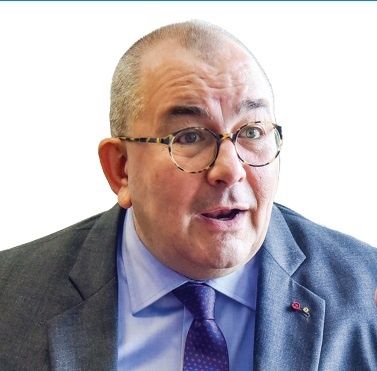30 years of accompanying the country’s key economic sectors part1
 |
| Denny Abdi - Indonesian Ambassador to Vietnam
I arrived in Vietnam early this year and found that the Indonesian Embassy in Hanoi has been a long-time subscriber of the weekly VIR. For me, it has been a good source of economic and investment-related information in Vietnam. Moreover, the publication is also beneficial for the foreign business community to better understand the country’s development and economic policies. During these past decades, business and economic media including VIR have played a critical role in disseminating the development and policy changes in the country so that the regional and international players could understand it. Moreover, it also promotes the country’s global vision to ensure these efforts ran on track. In addition, the role of English language media such as VIR has been crucial in conveying domestic policies to the international public to translate Vietnam’s vision into global cooperation successfully. Indonesia was among the first countries to invest in Vietnam after the enactment of the Law on Foreign Investment in 1987. There are currently more than 30 Indonesian companies operating in Vietnam, and their investment remains robust and contributes to the economic partnership between the two countries. Indonesia and Vietnam have been strategic partners since 2013 with wide-ranging collaborations in many areas of interest and robust partnerships in regional and multilateral fora for the development, peace, and stability of our nations and our region. This strategic partnership remains more crucial than ever, as the global pandemic affected many aspects of our lives. To achieve a strong and sustainable two-way trade turnover of $10 billion, Indonesia and Vietnam shall pursue and intensify cooperation in potential interest areas, including the high-tech industry, digital economy, and fisheries. The two countries have a sizeable young population with a grand vision of new research and technology that can play an essential role in national development. Moreover, I also believe that promoting deeper collaboration in the fisheries industry shall benefit our two people as both Indonesia and Vietnam are rich with marine resources. VIR has become a key business and economic press office in the country, offering insight into Vietnam’s economic reforms, business environment, and international economic and trade. Therefore, we hope that it can continue its role in promoting Vietnam to the world and supporting the efforts to strengthen the bilateral partnership between Indonesia and Vietnam. | |
| Jaya Ratnam - Singaporean Ambassador to Vietnam
Singapore and Vietnam enjoy a longstanding and multi-faceted relationship. We have close cooperation across a wide range of sectors, such as defence, education, finance, tourism, innovation, and technical assistance. A key pillar of our bilateral relations, however, is undoubtedly trade and investment. Our strong economic cooperation has persisted even amidst the challenges of the pandemic. Singapore was the largest source of foreign investment into Vietnam, with the total investment capital of $9 billion in 2020, and the figure sat at $6.2 billion in the first eight months of 2021. This is a testament not only to the close links between our two countries’ business ecosystems, but also the sustained confidence that Singaporean companies have in Vietnam’s economic performance and potential. This robust economic relationship bodes well for the future, which will undoubtedly present many new opportunities for further collaboration. Singapore and Vietnam are already exploring ways to work together in emerging sectors such as smart cities, the digital economy, and sustainable development. Such cooperation would be impossible without deep mutual understanding and trust between our leaders, businesses, and people. VIR has been instrumental in contributing to this. Over the years, it has helped to increase Singapore and Vietnam’s awareness of each other’s priorities, advantages, and challenges, thereby enabling both sides to gain better insights that facilitate deeper bilateral cooperation. The embassy in particular has enjoyed a fruitful partnership with VIR. We appreciate its reporting on key economic developments in Vietnam and Singapore, as well as coverage of numerous interviews with Singaporean ambassadors. Through the latter, we have been able to share Singapore’s perspectives and aspirations for growing bilateral ties, especially in trade and investment. I look forward to continuing this partnership with VIR in the coming years. | |
| Robyn Mudie - Australian Ambassador to Vietnam
Throughout the past 30 years, VIR has proved to be one of the leading media outlets in Vietnam with high-quality and reliable news and analysis of the business environment. This is crucial for supporting local and foreign enterprises in Vietnam, including Australian investors. It helps us all stay well informed on the state of the economy and economic policy in Vietnam. When I first picked up a copy of VIR while posted to Vietnam in the early 1990s, the country was an emerging but still largely centrally-planned economy, with close to 80 per cent of people living in poverty and 50 per cent in extreme poverty. The country has improved living standards to a remarkable degree, reducing the poverty rate to 6 per cent and extreme poverty to 2 per cent. And over the last year, in the face of the grimmest of public health and economic challenges, Vietnam has also shown a remarkable level of economic resilience. VIR has been an important part of Vietnam’s development story, providing a reliable and comprehensive source of information for decision-makers, foreign investors, and the Vietnamese business community. Indeed, VIR itself was a product of early international collaboration, between a group of Australian reporters and Vietnam’s State Committee for Investment and Cooperation (now the Ministry of Planning and Investment). It was also a place where many young Vietnamese journalists began their careers, and I was privileged to have a number of friends working at VIR. Today Vietnam and Australia are strategic partners, with many shared interests and a shared commitment to the prosperity and stability of our region. Together, we are working to build on that partnership in new ways, including through the development of an Enhanced Economic Engagement Strategy (EEES). With the aim of becoming top ten trade partners and doubling investment, the prime ministers of Vietnam and Australia agreed to develop the EEES on the occasion of Australian Prime Minister Morrison’s visit to Vietnam in 2019. The strategy will solidify shared commitment to trade liberalisation and economic connectivity, and help both countries take advantage of emerging market opportunities. It is expected to further boost the current excellent ties in bilateral trade, investment, and development. Today, VIR continues to be well-read by the embassy’s economic teams as a source of information on the major trade, investment, and business developments occurring in Vietnam. More broadly, the reliable updates and insights it provides are particularly relevant as government decision-makers and businesses grapple with the ongoing pandemic. VIR today is a leading local press office specialising in providing up-to-date reports on economic and investment policies to the business community. I am very proud of the early contribution made by Australian reporters in the early 90s, especially on the development of the branded English-language version. | |
| Grete Lochen - Norwegian Ambassador to Vietnam
I arrived in Vietnam in 2018 and in my meetings with the Norwegian business community here, the newspaper was mentioned by many businesses as a reliable source of information about investment activities in Vietnam. In addition to the general news, I have found VIR to be an interesting newspaper that provides readers with up-to-date and in-depth information as well as analyses including policies of the government, investment activities in general, funding opportunities, and more. The Norwegian Embassy to Vietnam feels grateful for the support and cooperation from VIR in following and reporting news about our activities in Vietnam including business promotion and investment cooperation between the two countries. For new investors who first come to Vietnam, they would love to see more information about the country’s updated legal framework for investment as well as incentive policies for the areas where investment is encouraged, which might change to accommodate the government’s priorities from time to time. This year Norway and Vietnam are celebrating the 50th anniversary of diplomatic ties between the two countries. In that time, 40 Norwegian companies have been established in Vietnam. I am happy that Norwegian businesses have been making positive contributions to the economic growth of Vietnam as well as creating jobs for Vietnamese people. I am sure, once international travel is properly resumed, that Norwegian companies will come to Vietnam. In that context, we wish VIR good health and look forward to reading more good-quality articles, as well as being supported by VIR in covering activities of the embassy and the Norwegian business community. | |
| Paul Jansen - Belgian Ambassador to Vietnam
Business newspapers are always very useful for me and my colleagues, especially because Belgium has many regional trade offices that are active in Vietnam. So, the newspaper is very valuable to be acquainted with what is happening in this country, especially today as we meet fewer people physically due to current restrictions. Likewise, aside from a source to gather information, VIR is also very important to spread information that we would like to publish. And of course, as it is in English, it is easier for me and my colleagues to use than Vietnamese equivalents. I would like to thank the publication because of the many interviews I have seen with people from industrial zones invested by DEEP C. It’s wonderful for us to see that foreign businesspeople here in Vietnam receive a voice in printed media, especially this one. From a Belgian point of view, articles concerning DEEP C and the logistics sector in general are very important to us. Currently, there is also another project in the pipeline for Belgium, the Netherlands, and Vietnam called the Project Smart Logistics Centre at Cai Mep Ha. It’s a project worth almost €1 billion ($1.17 billion), which will not only be useful for Belgian and Dutch companies but also for Vietnamese enterprises, especially those in the agricultural sector here. With this platform, Vietnamese fruit and vegetable exporters could increase their business in Europe. Within the project, we will install cooling units close to the fields where the fruit and vegetables are produced. With a chain of these fridges, we will enable the transport to Rotterdam and Antwerp as the main ports elsewhere in Europe. Thus, this is a very promising and interesting project, which was also discussed during the visit of Vietnam’s National Assembly Chairman Vuong Dinh Hue to Belgium at the beginning of the month and during the online meeting of our countries’ prime ministers two weeks ago. So, hopefully, this endeavour will materialise in the coming months and be accompanied by VIR. Along with the project in Cai Mep Ha, we would like to continue using VIR and other newspapers to publish information, business opportunities, and receive some kind of return from the Vietnamese business community. So far, the relationship has been very good. We have had a very fruitful exchange through VIR and other media with the local business community, such as the Vietnamese Chamber of Commerce and Industry, among other organisations. So, we would like to keep this cooperation. But hopefully, we’ll also be able to meet people physically again. In the meantime, I thank VIR for providing us with the link to the local business and investment community, as it is crucial for the business and diplomatic communities in dealing with trade and investment, and it’s a very important tool for us. | |
| Elsbeth Akkerman - Dutch Ambassador to Vietnam
It is crucial for the international business community to have platforms for dialogue on views and concerns are crucial to secure the future social and economic growth of Vietnam. As such, VIR has been providing a platform for dialogue for already 30 years and I would like to congratulate VIR on that. Relations between Vietnam and the Netherlands go back a long time and continue to develop under the umbrella of the comprehensive partnership which was signed by both our prime ministers in 2019. We also have strategic partnerships on climate change and water management and agriculture and food security, and we continue to develop our cooperation in the field of logistics, energy, and the circular economy. These strategic topics are the proud base for the strong relationship between the Netherlands and Vietnamese business communities. Currently, the Netherlands is the largest investor from Europe with a total of $10.35 billion of investments in Vietnam. And the Netherlands is the largest European export destination of Vietnam, with annual goods worth $7 billion being shipped to my country. Obviously, we hope that we can further solidify our excellent economic cooperation and broaden it. The number of Dutch companies doing business in Vietnam has grown steadily over past years, and Vietnam is now home to Dutch household names as FrieslandCampina, Philips, Heineken, and Shell, but more and more small- and medium-sized enterprises find their way to Vietnam as well. As an embassy, we try to prepare them well for their first steps into the Vietnamese market, just like the Dutch Business Association in Vietnam has programmes and services to support the business of their more than 120 members. For success in Vietnam, Dutch entrepreneurs depend on an environment where they can have access to information on relevant developments in the economy, in politics, and in society. VIR actively contributes to that environment and thereby to the growth of our economic relations for the benefit of our countries, our peoples, and our planet. | |
| Joseph Mayhew - Chargé d’Affaires, Embassy of New Zealand in Vietnam
On behalf of the Embassy of New Zealand in Vietnam, I wish to congratulate Vietnam Investment Review (VIR) on the occasion of its 30th anniversary. VIR has always been a reliable source, providing in-depth and accurate information on trade, business, economic, and social news to Vietnamese readers and the international community in Vietnam. Over the year, the New Zealand Embassy has enjoyed great support from the newspaper. We appreciate your coverage of the embassy’s events, bilateral visits, development projects, and a number of high-level interviews with former prime ministers, ministers, and vice ministers of trade, and ambassadors, through which we have been able to share how we are growing the New Zealand-Vietnam relationship, even amid COVID-19. I am pleased to say that despite the pandemic and all of the challenges thrown at us, our relationship has continued to thrive. With the successful launch of the New Zealand-Vietnam Strategic Partnership last July, our two prime ministers laid out the challenge of deepening and broadening our relationship. As both our countries look to achieve strong economic growth as part of COVID-19 recovery, the ambitious trade goals we have set will be an important focus. We are fortunate to have high-quality FTAs such as the AANZFTA, CPTPP, and RCEP, which link our two countries together so we will work hard to ensure exporters in both countries are able to leverage those agreements. A key ingredient for a bilateral relationship is mutual understanding between our people. A big thanks to the VIR for helping to build a bridge of knowledge and trust between our people and businesses. | |
| Matti Tervo - Counsellor, Embassy of Finland in Hanoi
The values of Finnish people have been mirrored in the relationship between Vietnam and Finland historically. Diplomatic relations were established almost 50 years ago were based on cooperation in areas such as pure water, education, sustainable forestry, and innovation. We are very proud to have been carrying this work over the generations with Vietnamese counterparts. VIR plays a significant role in this. It is likely that VIR was the very first English-language newspaper in Vietnam to publish news about Finland in this country. Many Finns who have been working in Vietnam over the decades recall the time when Vietnam opened to world integration and VIR’s role in delivering the news. Current VIR reporters such as Bich Ngoc have even visited Finland along with other journalist colleagues to discuss matters with top Finnish companies and our chamber of commerce. Many years ago, imports were lingering at a mere €49 million ($58 million) per year but now, with the EU-Vietnam Free Trade Agreement now in effect, we can expect imports to Finland to achieve €400 million ($473 million) per year. VIR’s commentary and journalism display great relevance to the relations of the two countries. We hope to see VIR report more on Vietnamese investments into Finland in the future as diplomatic and economic relations step into a new era. We also see that Vietnam and Vietnamese people can greatly benefit from Finnish technology to reflect the values that the Vietnamese people also embrace: clean air, clean energy, and a clean environment. | |
| Vu Thi Quynh Hoa - National director, Oxfam in Vietnam
Over the years, Vietnam Investment Review has established itself as a source of timely and reliable information. I appreciate it for bringing a multi-dimensional picture of investing and development of Vietnam to readers in the country and beyond in which inequality and sustainable development have been highlighted beside economic growth. On the behalf of Oxfam in Vietnam, I express our gratitude for the work carried out by the publication to keep readers up to date on global and local contemporary issues such as climate change, gender equality, wealth distribution, and inclusive business in the bigger picture of economic development. It would be great if the publication bi-annually publishes its special Sustainable Development edition and features development issues on a weekly basis. That would help inform readers’ view of economic development with consideration of people’s wellbeing also. I wish VIR continued success. | |
| Nguyen Hong Ngan - Senior external relations officer, World Bank in Vietnam
As one of the first newspapers targeting readership in the expatriate and business/economic community in this country, Vietnam Investment Review has been growing nonstop, providing readers with truthful, insightful, and updated information. It has become an indispensable part of the media landscape in Vietnam and a faithful companion to many international organisations, including the World Bank as well as foreign other enterprises and investors doing business in Vietnam. Born while the country was quickly integrating into the international community, the paper has not just witnessed all of the country’s major developments since the 1990s, but also timely and truthfully informed the public about those events with deep insight. As readers, we all benefit from the paper’s in-depth analysis, expert insights, and timely news about different industries, especially about Vietnam’s economic policies and developments. The newspaper has also been a platform for healthy public debate about the country’s visions, strategies, and paths for long-term development, to reach its aspiration of becoming an upper middle-income country by 2030 and a high-income country by 2045. Being a faithful reader of the newspaper from its early stage, I am glad to witness the newspaper’s development from a single printed newspaper to a multi-product, multimedia agency with diversified channels, catering to the need of different audiences. Vietnam is entering a new phase of development this year, and so does VIR. The public demands higher quality publications from content to cover, and timely delivery of information. There are a lot of opportunities for the newspaper to continue to explore and grasp, so as to gain a strong foothold in the new generation of readers. | |
| Vu Ba phu - Director, Trade Promotion Agency, Ministry of Industry and Trade
Vietnam Investment Review has supported the business community to improve their capacity to build and protect their brands in domestic and international markets, while simultaneously enabling them to protect the interests of consumers and contributing to ensuring rigorous law enforcement in trade promotion. It has been a great reference for those operating in economics, and has created an opportunity for the Trade Promotion Agency (Vietrade) and the Ministry of Industry and Trade (MoIT) to share their views on trade issues such as promotion and export supports. Amid many fluctuations in the domestic and global economies and limited state budget for trade promotion activities, Vietrade – together with other state management agencies – has been presiding over the effective implementation of trade promotion activities and supporting the foreign trade development through national target programmes such as the Vietnam Value Programme and the national brands. Between 2003 and 2019, Vietrade submitted to the minister of Industry and Trade for approval over 3,200 national trade promotion projects, with a total budget of over $91 million. These projects have been focusing on export promotion, domestic trade promotion, and trade promotion in mountainous, border, and island areas. Through seven events held since 2008, there have been nearly 400 enterprises recognised for their national brands. Enterprises participating in the programme all maintained high growth rates in terms of profits, revenues, and domestic and international market shares. Since the pandemic emerged, we have implemented activities to connect Vietnamese enterprises online with international partners. These online trading activities have helped businesses save costs and find many new partners. Vietrade is continuing to deploy these online trade connections to expand towards foreign markets such as Europe, America, South Korea, Singapore, the Middle East, and many more, prioritising the export activities of agricultural and aquatic products and the import of raw materials and auxiliary materials for production and export. Accompanying Vietrade, VIR has extensively mentioned diversified and profound trade and investment issues in its prestigious English-language newspaper. Its many articles contain a lot of constructive information, with many works being well-invested, elaborately reflecting issues of public concern. The articles offer suggestions to promote innovation in economic management, investment, and trade, as well as the sense of integration while approaching international standards. Throughout the last 30 years, VIR has gone through many innovative steps to adapt to the changing reading trends in modern society and create achievements and values. However, in an era when journalism is being reshaped, VIR needs to protect its objective focus and offer genuine news. The focus should continue to lie on its readers, such as domestic and foreign organisations, experts, businesses, and individuals interested in economy, investment, and trade. Within just one article, it is impossible to tell the entire tale of solidarity, the overcoming of difficulties, and excellent achievements of the team of VIR journalists during the past 30 years. The dedication of VIR reporters, editors, and leaders has always been appreciated by Vietrade. | |
| Nguyen Tri Hieu - Economist
I got to know VIR while I was living and working in the United States. For more than 20 years, the newspaper has gone through many great changes in both content and form. The newspaper has approached the life and voices of economists, investors, businesses, and people interested in economics and investment. VIR has now a wide variety of publications and many issues focusing on interesting topics. As an official newspaper, it is a sociable news agency which participates in the economic journalistic life of Vietnam with timely news reports, objective commentary, and factual observations – all of which are especially important for investors. The pandemic led to the need of more cooperation between the international community, investors, businesses, and people. Thus, now is an important time to change media thinking, and VIR needs to have more critical articles and objective and multi-dimensional opinions to widen public opinion. If the pandemic prevention and control measures need to be adjusted, VIR should state the reasons and causes leading to these adjustments, instead of letting the reader have to research for themselves. The information published on VIR is relatively appropriate, because the media in Vietnam has certain limitations. But from a purely foreigner’s point of view, learning about the country’s economy and investment environment still requires more objective information and analyses of Vietnam’s economic situation, and especially critical opinions. VIR mentions a lot from the investor’s point of view, but there is still a lack of articles about the risks and disadvantages of investing in Vietnam. It has a very large number of readers and needs more objective and comprehensive articles. To do so, the newspaper needs to change its way of thinking and communicating about the limits of the economy, because the information in the newspaper is especially important for investors at this time. Good news in the press is needed, but investors are interested in very accurate information. In such a crisis, people’s worries are not superfluous. Amid investor anxiety, they will find a defence mechanism. On the contrary, if they are optimistic about the market, they will continue to invest, but in the end, their damage would not only direct towards businesses but also the country. | |
| Greig Craft - Founder and president, AIP Foundation
My early experience with business in Vietnam – I came in 1989 for the first time – was to directly see and analyse development and investment opportunities, in order to make professional and accurate decisions. This required numerous on-site investigations throughout the country, while developing relationships with the government in Hanoi to better evaluate business conditions and regulations. The media in Vietnam has played an integral and extremely important role in the rapid development of the nation. Its reliable reporting has had a major role in encouraging the huge influx of foreign investment over the past 30 years. Such investment attraction to the country implies added value and innovation. For example, the main challenge I faced with Protec, the social enterprise I also founded in 2000 to produce ethically made helmets, was to produce a high-quality product at affordable prices. We used the philosophy of striving for the highest possible standards of production. Another bold choice – at that time - was to employ people with disabilities. They are a very loyal and professional workforce and must not be forgotten by investors throughout the region, and especially in Vietnam. The world is truly connected now. I believe that a key reason Vietnam has done well is because of its media and press. This provides the global investment community with the ability to rapidly assess and determine market shifts, changes and new opportunities that will happen. Another consideration is that the media should be proactive in defining themselves. VIR, for example, realised that a strong business model is not only to provide facts and figures. It must be broad-based enough for investors to understand trends, consumer demands, and new directions in health and fashion, for example. Why? Because that is what business requires to make strategic decisions and investments. How can a company know what to develop if they do not understand what society and customers need? So, where investors obtain their information is essential. Social responsibility and “storytelling” are equally important to convey impactful information, even in business-focused media. The AIP Foundation, the non-profit organisation I founded in 1999, for instance, was at the forefront of recognising “the power of the pen” for behavioural and policy change. Our campaign “Wear a Helmet. There Are No Excuses” was broadly supported by the Vietnamese media. To this day, I credit the media for influencing the passing of the law for mandatory helmets for all motorcycle drivers and passengers. From 2008-2020, this law and the resulting increase in helmet enforcement across Vietnam has saved over 25,000 lives, prevented well over 845,000 head injuries, and saved $6.2 billion in medical costs, lost output, and pain and suffering. At all press conferences or media workshops in which I participate, I always emphasise that journalists are major partners to help us achieve our message and vision to make Vietnam a safer and healthier environment. They are the ones who disseminate and influence their peers, impact the older generation, and impact the government. These are the very basics of what the media and the press are all about. | |
| Caitlin Wiesen - Resident representative in Vietnam, United Nations Development Programme
I would like to extend my sincere congratulations to VIR on its special 30th anniversary. VIR is one of the newspapers in Vietnam that I have enjoyed reading every morning since I arrived in the country in 2017. The newspaper provides timely updates on the country’s development, covering issues of economy, investment, business, the environment, industry, and technology which have been very helpful for our work and discussions with our partners in Vietnam. I find the special coverage of current events on socioeconomic development and COVID-19 response particularly useful. I am very pleased to see VIR engagement in promoting the green growth agenda and resilience building including renewable energy, energy efficiency, greener transport, environmental protection, climate change, and also disaster risk management. We work to support Vietnam to build resilience of vulnerable communities on the coast, in the Central Highlands, and in Mekong Delta regions. We also work to expand renewable energy and green transport, with the engagement of all stakeholders across ministries, local communities, and the business sector. I have had some opportunities to work with VIR’s journalists and have been impressed with their professionalism. Following our organised media training that national and VIR journalists were invited to join in the south-central province of Quang Ngai, a series of articles were swiftly produced on the importance of resilient housing as well as mangrove regeneration. The information helped improve local resilience and reduce the economic damage to businesses and the local communities they work with. The United Nations Development Programme extends its best wishes to the publication for its continued success. | |
| Alain Cany - Chairman, European Chamber of Commerce in Vietnam
I have positive memories of the time I arrived in Vietnam in 2002 to run a large foreign bank, with little knowledge of the local economy. My first priority every Monday morning was to read VIR from front to back before starting my meetings, as it provides an invaluable news service for enterprises to keep up-to-date with new regulations that affect their investments and commercial operations. One of the biggest challenges in the future will be reflecting the changing nature of foreign-invested enterprises in Vietnam. Of course, we will continue to have the large multinational corporations which have been here for decades. However, Vietnam is cultivating – and attracting from overseas – innovative startups and small/medium enterprises in new sectors and industries. Therefore, it will be important for VIR to reflect the needs and priorities of such groups in this and other developing sectors – as well as those of multinationals – not least because the government is targeting the digital agenda as part of the Industrial Revolution 4.0. In particular, VIR could be a useful platform for these companies to share their insights with the government as well as both domestic and international business communities through interviews, articles, and events. Likewise, Vietnam is very much at risk of climate change and we know that the government is targeting more green and sustainable overseas investment. It will be important, therefore, for VIR readers to understand the challenges and opportunities for companies to make their operations more sustainable. It will also be important to provide a platform for businesses – such as those in EuroCham’s Green Growth Sector Committee – to comment on government policies in these areas so that Vietnam can attract more foreign investment in these sustainable industries. I think the most important thing – from the perspective of international investors and business owners – would be for VIR to host events that help enterprises to unlock the full potential of the Vietnamese market. For instance, business-to-business or matchmaking events – in person or online – could help domestic and foreign business communities to build new relationships, join new value chains, and improve bilateral trade. Likewise, business-to-government events that connect companies with Vietnam’s localities outside the traditional investment destinations of Hanoi, Ho Chi Minh City, and their surrounding provinces would help investors to discover new locations and local authorities to secure important new sources of capital. | |
| Pham Hoang Hai - Executive director, Italian Chamber of Commerce and Industry
We have had a tumultuous 2020 and 2021 also has offered up many challenges. Perhaps no-one in the business community was prepared for such a scenario, but the solutions of a small number of businesses have proven effective. The business environment always contains elements of surprise. For medium- and long-term investment projects, investors always first consider political stability, the development of the economy and of the industry in particular, tax and financial incentives, and the legal framework in the country. Investors need to have access to that information through an official channel that is easy to understand, updated, and condensed. That is the reason why the birth and development of VIR is so important because it addresses the needs of foreign investors and the business community. And especially, with the Italian business community operating in Vietnam, we consider VIR as a very effective channel to reflect on issues and raise opinions because we know that our message will be conveyed to the relevant ministries and agencies, and at the same time other businesses also understand our perspective and assessment. The Italian business community in Vietnam would like to hope that VIR continues to develop in a stronger fashion and accompany the business community in the development of investment and business activities as well as development of the Vietnamese economy in general. On the occasion of the 30th anniversary, we wish all of you at VIR good health and bigger success. | |
| Vaibhav Saxena - Vice chairman, Indian Chamber of Commerce
The information published in VIR is precise and meaningful, especially information about investment, mergers and acquisitions, and expansion of production and business of enterprises. It closely follows the operation of enterprises, reflecting their problems and also their successes. In particular, VIR offers detailed information from economic experts and policymakers, which is useful for businesses. Through the publication, the government agencies have more information to refer to new ways and/or good models across the country to apply, constantly improving the position and image of the agencies. Moreover, the publication creates many opportunities for exchange and cooperation that have been opened for businesses and also acts as a bridge for businesses to approach and be closer to partners and consumers. In addition, through VIR, enterprises can grasp changes in policies to promptly adjust business activities accordingly and the direction of guidelines of the government on attracting foreign investment. At the same time, VIR is also a platform to convey the opinions of foreign investors to the management agencies, in order to contribute to creating an increasingly competitive investment environment. The most impressive thing probably comes from the corporate social responsibility activities of VIR. The annual Swing for the Kids charity golf tournament has raised money each year to support thousands of scholarships for poor students across the country. Moreover, mobilisation to raise funds for the construction of infrastructure, to take care of heroic mothers, to gather support for people in areas affected by natural disasters and floods, and to give Lunar New Year gifts to disadvantaged people are gestures made with the enthusiastic hearts of VIR. The worldwide media faces a common problem of transparency, accuracy, and depth of information published in the newspapers. To avoid making these common mistakes, VIR may consider adapting further to the market mindset from time to time. This way VIR can promote entrepreneurship, promote a healthy business environment, and support the foreign investment atmosphere in the country. VIR may also further consider running more in-depth business articles. Enterprises are interested in information about policies and the macroeconomic situation, but keep higher interest in specific cases and the practicality of an issue. VIR will be expected to continue to carry out activities to promote entrepreneurship, connect and protect businesses, promote a healthy business environment, and accompany government agencies by providing faster and more detailed information. But it is also necessary to maintain the activities demonstrating the corporate social responsibility activities which VIR organises to contribute to the development of the country’s economy and help others in need. | |
| Colin Blackwell - HR committee chairman, Vietnam Business Forum
Back in the mid-1990s, I remember often reading VIR whilst having a cup of coffee at the Floating Hotel in Ho Chi Minh City, not just because it was the only thing available in English, but because it was informative. All these years later, it remains an expatriate favourite for the same reason. I know it is widely read by diplomats and CEOs of the top foreign-invested enterprises in Vietnam, because many of them reached out to me after some of my previous articles. With VIR’s popularity comes responsibility. As a leading voice for the foreign business community, it must help to lead towards a more prosperous future. This becomes even more essential now, during the challenging circumstances imposed by the pandemic. The foreign-invested enterprises are central to the productivity gains needed for the country’s national economic progress. So VIR is vital to bridging this community to the public and other stakeholders, towards our shared wish for progress. Personally, I see the most important topic to be communicated is business modernisation. It is a target for all countries globally, but each in its own way. Vietnam is finding its unique path to success, as evidenced by our country often topping international performance measures. VIR is excellently positioned to articulate and spread this positive news of Vietnam’s winning ways. Within modernisation, I would pick on digitisation and the accompanying human skills requirements as the foremost theme. Relentless global technology advances bring ever-accelerating opportunities and risks, which the pandemic has sped up even further. Within the last couple of years, many Vietnamese businesses rapidly moved to e-commerce, remote working, and automation. All aspects of society are affected, including for example government services moving online. Whilst there is sadly economic hardship presently, this recent digitisation will have very strong economic advantages in the medium and long term. Digitisation is a benefit in itself, but must be accompanied by a modernisation of the workforce’s skills to be fully effective. Some old fashioned unnecessary jobs will be removed from the economy, to be replaced by more valuable, interesting modern job opportunities. These new jobs rely less on memorisation and repetitive processes, as computers do this better almost for free. What is needed are the human skills of creativity, empathy, communication, and problem-solving. To gain the requisite level of these new skills at a national level requires a massive realignment of the education sector and the human resources approach within the business community. Whilst most people agree with the end goal, they are keen to hear what this means in practice. This is where VIR can champion the stories of businesses that have taken practical steps towards modernisation. By hearing the precise real experiences of others solving these challenges already, others can improve their own chances of success. Whilst VIR is evidently in English and subsequently popular with international business people, it also has a growing audience of Vietnamese businesses who are keen on these same topics such as digitisation. The message is positively amplified when its articles are translated into Vietnamese and carried in other national newspapers. I am confident the foreign-invested sector is more than willing to continue sharing their stories and ideas, hopefully to the benefit of all. | |
| Shimizu Akira - Chief representative, JICA in Vietnam
In my role a head of mission of JICA in Vietnam, acquiring quick and reliable information is inevitable. In this aspect, VIR is one of the most reliable information sources for me, which helps and leads me to make the right decision in project implementation and planning. Your excellent analyses of the events in the country provide great insight and a treasure chest of knowledge about investment in Vietnam and the wider region. I like the Investing and Green Growth columns, which I find very informative about official development assistance (ODA), overseas investment, and other factors of the business environment in Vietnam. Through ODA we emphasise not only infrastructure and human resource development in the country but also enhancement of foreign funding, which helps the development of Vietnam. And so acquiring reliable information quickly, especially in the field of private sector activities, is very important. Such information is a great help to gain new ideas for our future activity plans which enhances not only the development of the country but also strengthens mutual understanding of Japan and Vietnam. In this regard, I highly appreciate the work of VIR’s professional journalists. I am very much expecting that this direction will succeed and be further developed. I wish my best to all people involved with the newspaper and wish for a prosperous future for VIR. In turn, we will also try our best to give the people of Vietnam good news through our activities. | |
| Raymond Mallon - Senior economist
Having spent most of my professional life working in the Mekong subregion, it has been fascinating to watch regional developments, including the emergence of an increasingly more professional foreign language press. Based in Hanoi since 1991, I first started working in Laos in 1984, and Vietnam in 1988. One of the key challenges during this period was getting permission to enter the country. Once I started working in Vietnam, it was impossible not to be attracted by the people, the energy, the landscapes, the food, and my future wife. Another key challenge was obtaining reliable information. When VIR commenced publication soon after I moved to Hanoi, it became easier to regularly access information on the economy, government policy, and business developments and concerns. VIR and the Vietnam Chamber of Commerce and Industry were instrumental in initiating informal and structured dialogues between the domestic and foreign business community and the government. I was working with the Central Institute for Economic Management and the State Planning Committee at that time, often in collaboration with other key departments. So, I saw first-hand how useful the information published by VIR and its associated media - and the dialogue this information stimulated - was in helping policy advisors to identify bottlenecks to business development, and in developing recommendations on policy and institutional reforms to ameliorate these bottlenecks. Such collaboration between the Vietnamese government and business has now been institutionalised. Regulations guiding the formulation of new policies and regulations impacting on business require consultations with the business sector during the policy and/or regulatory reform and development process. VIR helped make this feasible and deserves part of the credit for making this happen. Occasionally, VIR journalists have asked me to comment on economic development issues. Subject to personal time constraints, I always try to help on issues where I have some expertise. The questions raised by VIR journalists are mostly stimulating, and I often found it quite a challenge to prepare a credible response within the required word limit and deadlines. I benefited greatly from the advice of VIR editors on how to present material in a more reader-friendly format. On the occasion of VIR’s 30th anniversary, I wish VIR all the best for the future and look forward to continuing to learn from their articles as I transition into semi-retirement. | |
| Winnie Lam - President, Canadian Chamber of Commerce in Vietnam
After many years as a reader, VIR is still my go-to medium for reliable and all-important news on the Vietnamese economy. Personally, I highly appreciate the series of articles related to the free trade agreements that Vietnam has signed with many major partners over the years. The concise presentation of VIR makes it easy for me to grasp the core information and at the same time, I can note the details that are not really the focus but are actually very important. Therefore, it is high on my list for all my initial learning about all aspects of operating in Vietnam. Positive social influence is one important indicator to evaluate the success of a press agency. I hope VIR will continue to be the bridge to convey objective and constructive information between foreign-invested businesses and authorities as well as the public. It would be great if VIR will also have more forums and exchange channels for small- and medium-sized businesses besides focusing on the big players. VIR can also connect businesses by industry, market segment, production chain, or by region or locality for them to discuss and find the most common recommendations, thereby creating more weight and consistency for their opinions when making recommendations to relevant authorities. I hope and believe that VIR will continue to organise events that accurately reflect the hottest issues that businesses are interested in. Topics on post-pandemic business restructuring, technology application in production and business automation, application of AI and big data, and effective communication when remote working for example will address the importance of going forward as a business in Vietnam. As a long-term professional businessperson working in Vietnam, I am always looking for breaking information and exclusive information. I continue to rely on VIR for that over other media publications. The appetite for visualised content or podcasts are growing and would be of great interest to business professionals who want the most information in the least time. Think of the increasing number of car users in Vietnam and the in-car audio being turned on throughout their journeys. Mobile-friendliness is also a strategy that VIR should aim for by developing a proper news application with a smartphone optimised format for convenience and penetration across all ages and localities. |
What the stars mean:
★ Poor ★ ★ Promising ★★★ Good ★★★★ Very good ★★★★★ Exceptional
Related Contents
Latest News
More News
- Businesses ramp up production as year-end orders surge (December 30, 2025 | 10:05)
- Vietjet chairwoman awarded Labour Hero title (December 29, 2025 | 13:06)
- How to unlock ESG value through green innovation (December 29, 2025 | 10:03)
- AI reshapes media and advertising industry (December 29, 2025 | 08:33)
- FPT and GELEX sign deal to develop blockchain tech for global markets (December 29, 2025 | 08:29)
- Vietnam’s GDP forecast to grow by 9 per cent in 2026 (December 29, 2025 | 08:29)
- Women entrepreneurs are key to Vietnam’s economic growth (December 29, 2025 | 08:00)
- Vietnam's top 500 value-creating enterprises announced (December 27, 2025 | 08:00)
- The PAN Group shaping a better future with ESG strategy (December 26, 2025 | 09:00)
- Masan Consumer officially lists on HSX, marking the next phase of value creation (December 25, 2025 | 13:20)






















 Tag:
Tag:





















 Mobile Version
Mobile Version